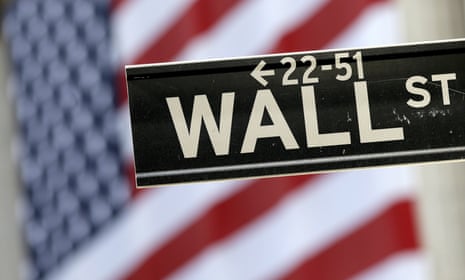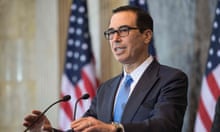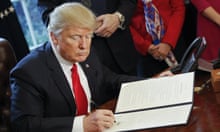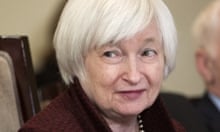“The last thing we want at this point in time is a relaxation of regulation,” said Mario Draghi, president of the European Central Bank on Monday. He is right to worry. Relaxation of financial regulation is exactly what Donald Trump has in mind and the effects could be felt around the world.
The US president seems to have accepted the half-baked idea that US banks are somehow so tied down by international regulations that they are obliged to hoard capital that could be used for lending to the American economy. “I have so many people, friends of mine, who have nice businesses who can’t borrow money,” said Trump when he signed an executive order last week.
There is little evidence that banks are refusing to lend to creditworthy borrowers in the US. In fact, the reverse seems more likely: credit availability in the US is strong, which is exactly what you’d expect given the healthy returns being reported by US banks. But that hasn’t stopped the new administration from trying to blame the Dodd-Frank regulations, the country’s response to the financial crisis of 2008-09, for all manner of ills.
Others have gone further. Republican congressman Patrick McHenry, vice-chairman of the financial services committee, last week suggested that the US should pull out of international bodies such as the Financial Stability Board (FSB) and the Basel committee that agrees standards for banks’ capital and supervision. McHenry’s argument is that US banks have been “unfairly penalised” by these “secretive” international forums.
It’s astonishing that a legislator from the country that inflicted Lehman Brothers on the world could be so critical of international efforts, with the US in the vanguard, to improve banking safety. But, even in its own terms, his argument is nonsense. US banks have been relative winners from reform. Their dominance of international financial markets is greater even than it was in 2008-09 and the explanation, in part, is surely that they were faster and more determined in raising the extra capital that the FSB and Basel committees requested. JP Morgan, Morgan Stanley, Goldman Sachs et al got back to the races years ago. By contrast, too many big European banks – think Deutsche Bank and Italy’s Unicredit – remain mired in crisis.
The alarming part of McHenry-style complaints is that they are a direct attack on the one part of the international reform agenda that appeared to have been settled – bank capital rules. Work in other areas, covering financial derivatives and central counterparties, is less advanced but also critical. “The ongoing support of G20 leaders is required to implement reforms fully, consistently and promptly,” FSB chair Mark Carney, our own governor of the Bank of England, reminded everyone last August. He was merely spelling out the facts. The FSB, formed in 2009, has few formal powers and instead relies on national regulations to implement standards all its members agree. Without the US, work would grind to a halt.
Draghi’s concern about timing is also powerful. The world is digesting eight years of near-zero interest rates and quantitative easing and the after-effects are unknown. But a combination of loose monetary policy and financial deregulation has been a disaster in the past, with 2008-09 being only the most recent spectacular example.
No doubt there are parts of Dodd-Frank that would benefit from a minor tweak or two – even former congressman Barney Frank, one of the architects of the legislation, accepts that small US banks spend too much time complying with rules that weren’t designed for them. But a major bonfire of capital rules and regulations, under a Trumpist “America first” banner, would be an appalling prospect. Even many senior UK bankers are astonished by the apparent power of Wall Street’s lobbying machine.
Ryanair hits turbulence but stays on course
Michael O’Leary at Ryanair has a characteristically long list of complaints about current market conditions: the fall in sterling; Brexit-inspired uncertainty over the UK’s future in the European open-skies system; over-capacity; charter rivals switching capacity from Turkey, Egypt and North Africa into Spain and Portugal; and various supposed German stitch-ups including a “monopoly” at Berlin airport and a “duopoly” between Lufthansa and Air Berlin.
A casual listener might think Ryanair was struggling to cope with so many dastardly developments. Not at all. Average fares fell by 17% to €33 in the third quarter but it is clear that Ryanair is inflicting more pain on the competition than it is suffering itself. It is the lowest cost operator by some distance, traffic was up 16% and full-year profit guidance was maintained at €1.30bn (£1.1bn) to €1.35bn barring “unforeseen security events.” The share price fell by 4% but, unlike easyJet’s, it has had an excellent run.
Next year will bring €65m of savings from hedging on fuel prices and, one suspects, more gains in market share, especially in Germany where O’Leary sounds like a man who will enjoy milking his allegation of cartel behaviour for all it is worth.





